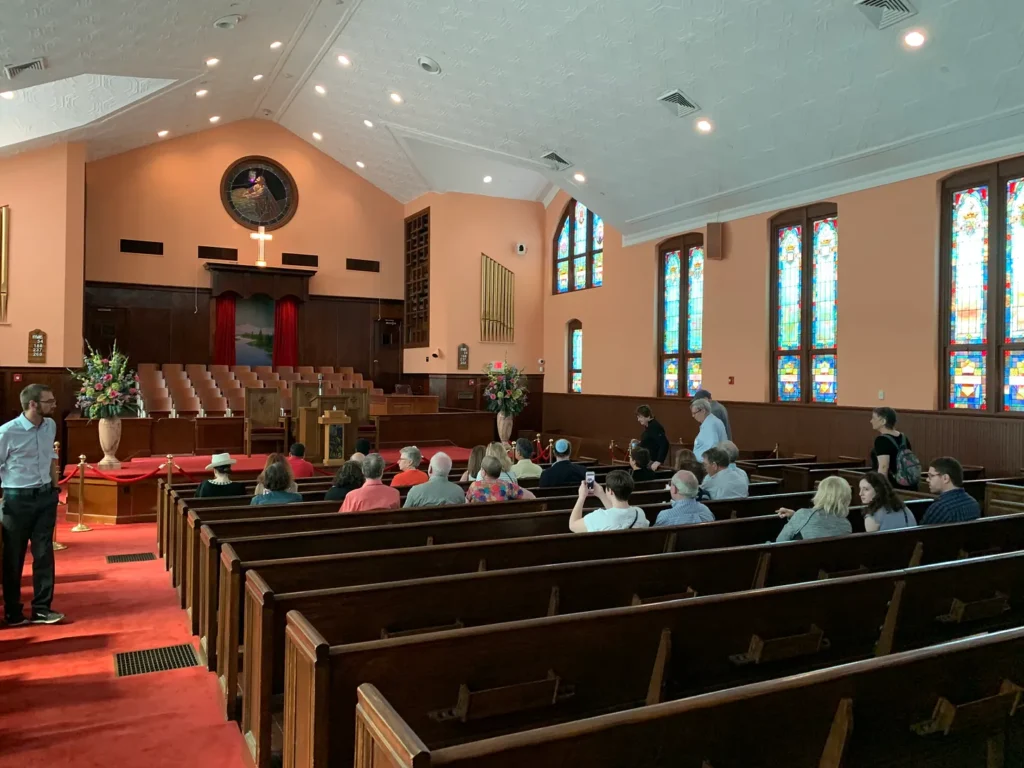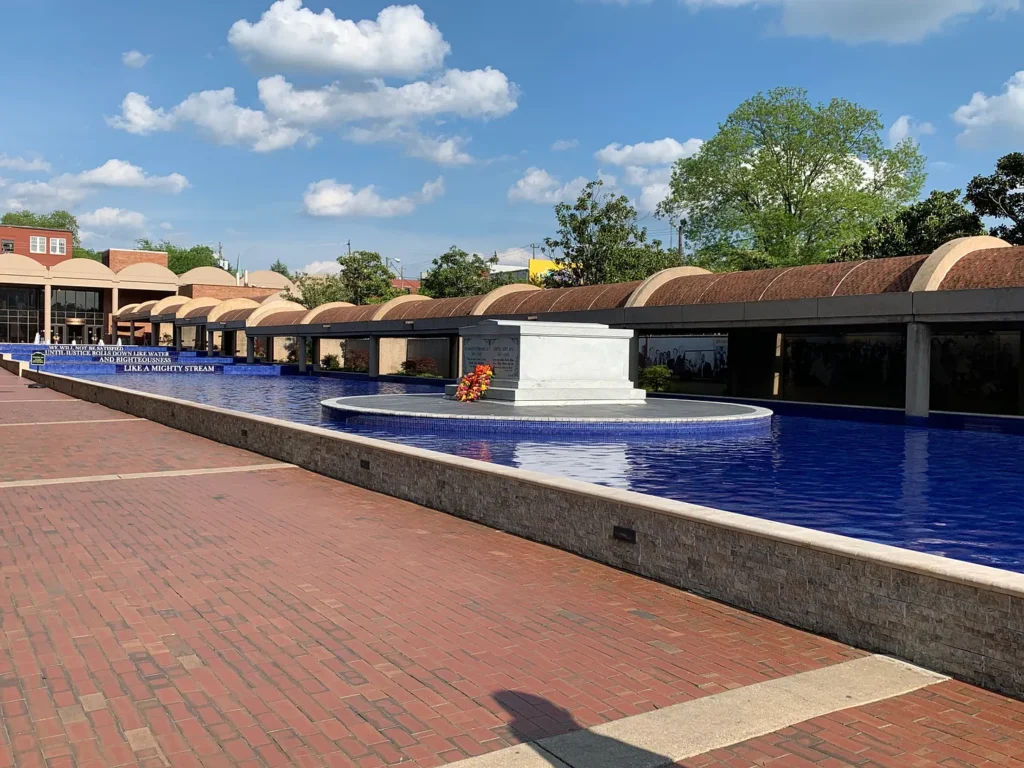Reflecting on two early speeches of Dr. Martin Luther King, Jr.

Earlier in the year, I decided to spend a bit more energy on Reverend Dr. Martin Luther King, Jr.’s speeches. Part of this was inspired by the opportunity to visit Dr. King’s church in Atlanta in 2019, twice.
I was given this chance twice due to participating in Etgar 36‘s adult trips to the South. First, on a JCPA trip with some Jewish and Black friends and colleagues from Pittsburgh, and second, on a congregational trip that I led.
Both were profoundly meaningful.
With the chance to get proximate, a term I learned on those trips, I wanted to spend more time with this man who inspired many while also reviled by the white majority around him.
So on this Martin Luther King Day in 2021, I thought I’d share a few reflections from two of Dr. King’s early speeches. (Note: all the bolding is mine):
In his speech, Our Struggle, which he gave in 1956, he spoke about the Montgomery Bus Boycotts:
The enlightened white Southerner, who for years has preached gradualism, now sees that even the slow approach finally has revolutionary implications. Placing straws on a camel’s back, no matter how slowly, is dangerous. This realization has immobilized the liberals and most of the white church leaders. They have no answer for dealing with or absorbing violence. They end in begging for retreat, lest “things get out of hand and lead to violence.”
In many corners of our lives, we have been told to be patient. That small changes along the way are the path forward. In many cases, patience is a useful tool. In synagogue life, patience is certainly helpful, as major, legacy institutions are like giant ships, turned slowly.
And yet, Dr. King here is clear, gradual change is often a response to violence. It is a stalling tactic to facing what we really struggle with. Our country, since that day in 1956, still hasn’t truly grappled with this violence, as we saw at the beginning of the year.
But it is this line that drives the point home for me:
“It is hardly a moral act to encourage others patiently to accept injustice which he himself does not endure.”
This is the line that pulled my heart into my throat.
I am a cis-gender, heterosexual man with white skin. I receive all of the benefits of privilege. And while it is true that in the United States, Jews are conditionally white, and being publicly Jewish does create some danger, I still receive all of the benefits of my white skin.
My desire, and our collective desire, for patience is not a moral act.
I don’t have to experience that daily injustice.
I do not have to worry about taking a run outside.
I do not have to be concerned if the police pull me over.
Many Jewish institutions, after the murder of George Floyd over the summer of 2020, took on racial justice as an important value, and a commitment to act, have dragged their heels. We want to “get it right” and “bring people along.”
These are all well and good, but that is because many Jews are not the recipients of such daily acts of violent injustice. That isn’t to say that Jews are free from injustice since collectively we are recipients of a lot of hate crime.
In 2019, I wrote a piece about facing our challenges with eyes and ears fully open. I wrote:
“And this is where we are. We have the opportunity to be those who stand at the edge of the promised land, a land full of justice, a land full of peace. We can be those people, whose lives are saved, but only if…
Only if we face what is plaguing us directly.
For as long as we continue to turn away from the copper snake of violence and racism in our community, as long as we turn away from children being placed in cages at our border, as long as we direct all of our attention on ourselves and our own pain, our community won’t be healed. We won’t make it to the promised land.”
It is easy to be patient when it is not in front of our eyes, every day. That is why the protests following George Floyd’s murder felt so immediate. We couldn’t pretend it wasn’t happening. All eight minutes were recorded for all to see.
Patience is not always a virtue.

Especially this year, during the pandemic, we have learned the lesson of the “flatness of geography” which is my way of saying, we are more connected than ever. The fact that we’re geographically separate has a different meaning now than it did a year ago.
In Dr. King’s speech, Facing the Challenge of a New Age (1957), he speaks on that sense of shrinking geography and our connectedness:
But, with the coming of anything new there are new responsibilities, new challenges. The new order brings with it new responsibilities. What are some of these challenges that stand before us as we confront this new order, which is inevitably coming? I would say that the first real challenge: to rise above the narrow confines of our individualistic concerns to the broader concerns of all humanity. You see, this new age is an age of geographical togetherness. No nation can live alone now; no individual can live alone. And we must all learn to live together or we’ll all die together. (Yes)
Here, Dr. King speaks about how interconnected we really are to one another. He describes that the new age, in 1957, as one in which we would have to begin to see humanity as a whole rather than each of us as individuals.
As Jews, our Tradition has always taught us that what fundamentally connects us is our obligations to one another.
This is distinct from the American legal approach that each of us has rights to do and rights from things. Dr. King is encouraging us to shift towards that “responsible for one another” framing.
How more true is this lesson today, during a pandemic with the internet, that we are responsible for one another? Connected regardless of place?
The world in which we live is geographically one. And now we must make it spiritually one. (Yes) Through our scientific genius we have made of the world a neighborhood. Now through our moral and spiritual genius we must make of it a brotherhood. (Yeah) We must live together as brothers and come to see that we are all involved in a single process. Whatever affects one directly, affects all indirectly.
We are still learning this lesson.
As Jews in the 80s used to fight for Jews under Soviet Oppression and how millions around the world marched for Black Lives this past summer, we are still awakening to the idea that we are in this together.
In 2019, I wrote this prayer for those who were in immigration detention, and I want to draw out one line:
“We ask that, we are able to fully conceive the idea that every one of us is made in the divine image. An image that inspires us to see that each and every human being is worthy of respect, of dignity, and of human rights. An image that reminds us that though we may not have lived the same lives, we share the same story, the story of humanity.”
While we have not all experienced the same things, we are still a part of the human family. We are all impacted by the injustice around us. It is still seeping into our souls, corrupting us while we’re not paying attention.
Dr. King continues:
Then my friends, we must continue to produce courageous, intelligent, and dedicated leadership. (Amen) In this tense period of transition, in this period of social change, we need, one of the great needs of the hour is for leaders who are both calm and positive (Yes), leaders who avoid the extremes of hot-headedness and Uncle Tomism. Leaders who somehow analyze the issues and press on with a vision determined not to stop but with wise restraint. (Yes) Leaders not in love with publicity, but in love with humanity (That’s right), leaders not in love with money but in love with justice (That’s right), leaders who can subject their particular egos to the greatness of the cause.
This feels just as true now as it was then.
We are in desperate need of real leadership. Leaders who love “humanity” and “justice” and see “the greatness of the cause.”
In that same speech, Dr. King begins his conclusion with this:
This is it. We’re doing all of this, I believe we will be able to speed up the coming of the inevitable. (Yes) We will be able, by the help of God, to bring in this new world. A world in which men will be able to live together as brothers. (Amen) A world in which men will beat their swords into plowshares, and their spears into pruning hooks. A world in which we will no longer take necessities from the masses to give luxuries to the classes. A world in which everybody will respect the dignity and worth of all human personality. (Yeah) That will be the day when God’s kingdom will be here.
We each have a role in speeding up the coming of the inevitable.
To bending the moral arc of the universe towards justice.
I am certainly no expert in Reverend Dr. Martin Luther King, Jr.’s work, his vision, and would not deign to speak about him as such. But like many, I am inspired by his words, his example, his fearlessness in the face of so much hate, his endurance, consistency, and truthtelling which led to his assassination.
In resonance with Dr. King, I want to offer this piece of text from our Tradition that feels relevant today. From Pirkei Avot:
וּבְמָקוֹם שֶׁאֵין אֲנָשִׁים, הִשְׁתַּדֵּל לִהְיוֹת אִישׁ:
In a place where there are no people, strive to be a person.
This is a charge to live with integrity, despite what is being done around you. It is the encouragement to stand up and do the right thing.
Sometimes, myself included, we don’t know where to begin, how to keep true to the task, to stay focused.
I find Rabbeinu Yonah’s commentary helpful here.
“…And do not refrain from becoming wiser, even if you cannot find a sage greater than you in your city. Even if there is no one like you in that [whole] generation, see yourself as [if you were] in the generation of the sages of the Talmud and you are with them in one place.
Even if you acquire their level, think as if you are standing with the prophets, up until Moshe, our teacher – peace be upon him. And when will you reach their level and their wisdom? And in this [way], you will never slack from learning Torah and you will improve your traits each and every day – as you will add to your wisdom and you will be like a flowing spring.”
In short, he says, never stop trying, keep learning, do your best.
It doesn’t matter how much you’ve learned, there is always more you can do. When you’ve reached one level, keep going. Improve, improve, improve.
The lesson here is to never stop improving.
On this Martin Luther King Day, I’m grateful to spiritually sit at his feet, to have spent some time in his church, and to reflect on his powerful words.